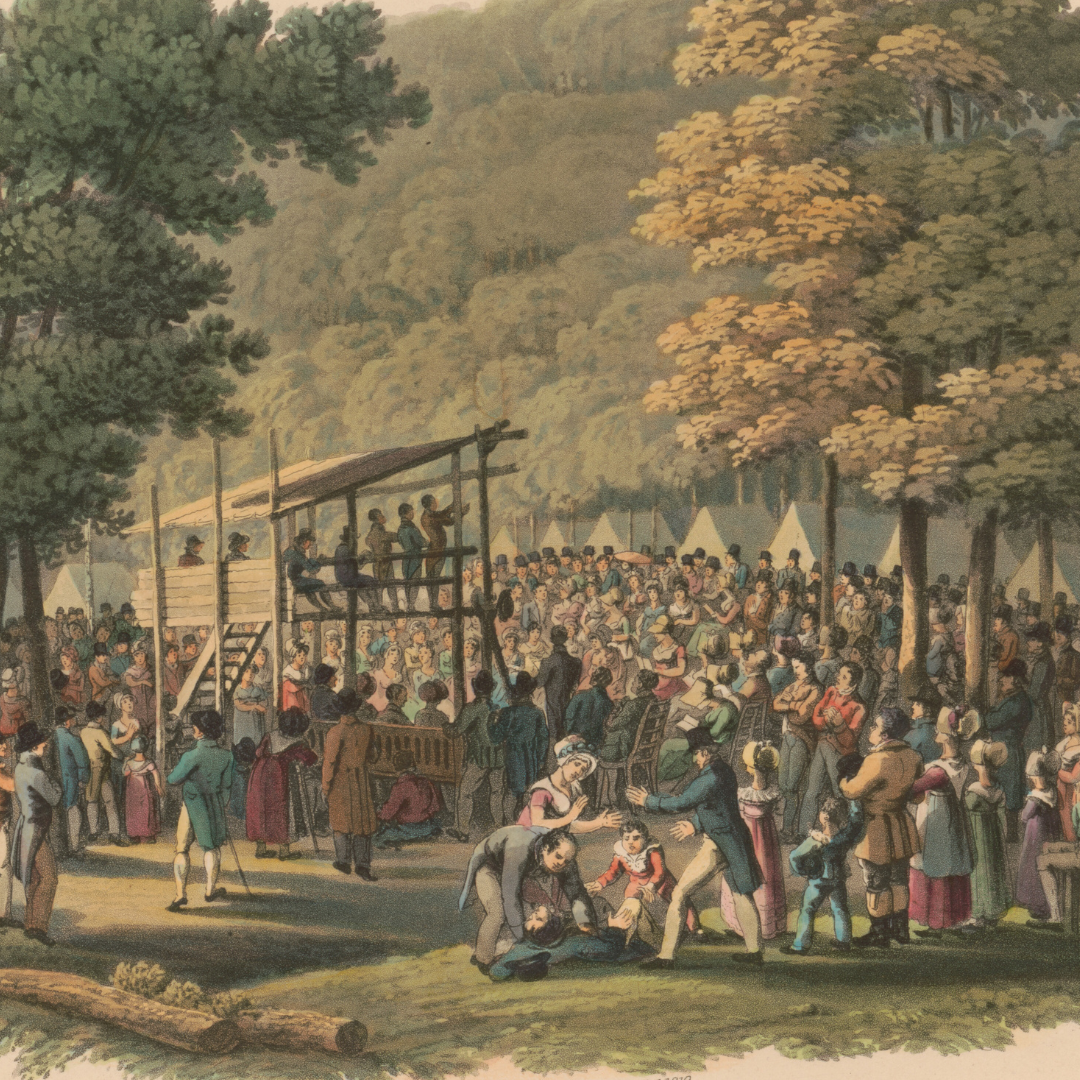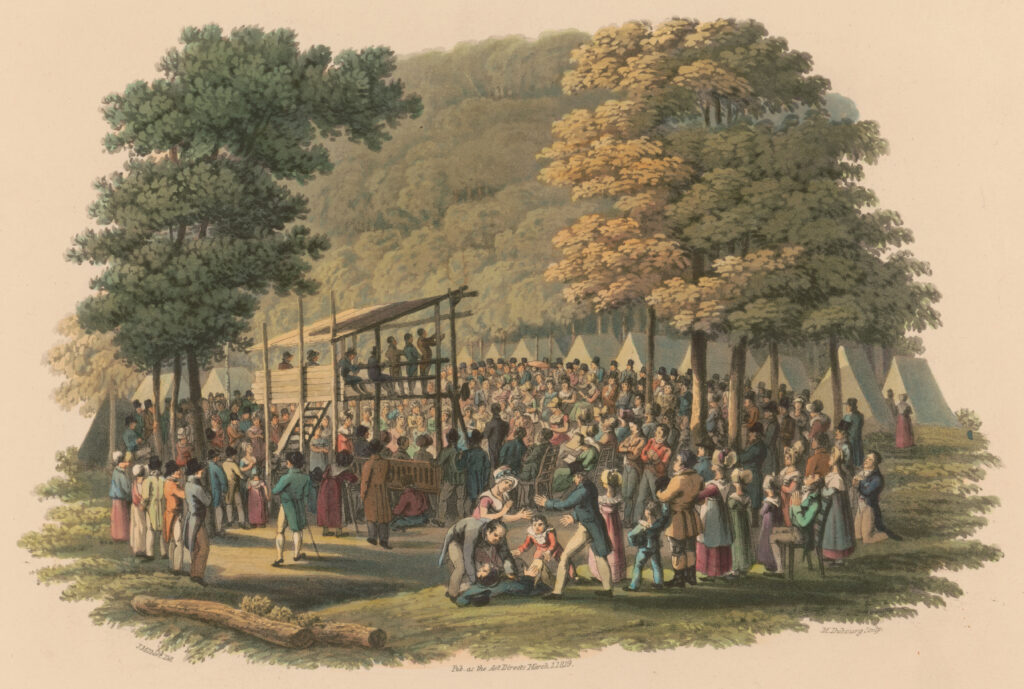
“Soon after we came to a Methodist encampment. This was formed of three continuous lines, each occupying a side of a square and about one hundred feet in length. Each row was divided into six or ten cabins with partitions between. The height of the rows on the inner side of the enclosed area was about ten feet, on the outer about six, to which the roofs sloped shed-like. The door of each cabin opened on the inner side of the area, and at the back of each was a log chimney coming up even with the roof. At the upper extremity of the inclosure, formed by these three lines of cabins, was an open shed; a mere roof supported by posts, say thirty by fifty feet, in which was a coarse pulpit and log seats. A few tall trees were standing within the area, and many stumps [Pg 58]scattered here and there. The whole establishment was in the depth of a forest, and wild and rude as can well be imagined.
“In many of these sparsely-inhabited counties there are no settled clergy, and rarely do the people hear any other than the Methodist preachers. Here is the itinerating system of Wesley exhibited in its full usefulness. The circuits are usually of three weeks’ duration, in which the clergymen preach daily. Most of these preachers are energetic, devoted men; and often they endure great privations.
“After sketching the encampment I came in a few moments to the dwelling of the sheriff. Close by it was a group of mountain men and women seated around a log cabin, about twelve feet square, ten high, and open at the top, into which these neighbors of my companion were casting ears of corn as fast as they could shuck them. Cheerfully they performed their task. The men were large and hardy; the damsels plump and rosy, and all dressed in good warm homespun. The sheriff informed me that he owned about two thousand acres around his dwelling, and that his farm was worth about one thousand dollars or fifty cents an acre.
“I entered his log domicile which was one story in height, about twenty feet square and divided into two small rooms without windows or places to let in the [Pg 59]light except by a front and rear door. I soon partook of a meal in which we had a variety of luxuries, not omitting bear’s meat. A blessing was asked at the table by one of the neighbors. After supper the bottle, as usual at corn huskings, was circulated. The sheriff learning that I was a Washingtonian, with the politeness of one of nature’s gentlemen refrained from urging me to participate. The men drank but moderately; and we all drew around the fire, the light of which was the only one we had. Hunting stories and kindred topics served to talk down the hours till bed time.
“On awaking in the morning, I saw two women cooking breakfast in my bedroom, and three men seated over the fire watching the operation. After breakfast, I bade my host farewell, buckled on my knapsack and left. In the course of two hours, I came to a cabin by the wayside. There being no gate, I sprang over the fence, entered the open door, and was received with a hearty welcome. It was an humble dwelling, the abode of poverty. The few articles of furniture were neat and pleasantly arranged. In the corner stood two beds, one hung with curtains, and both with coverlets of snowy white, contrasting with the dingy log walls, rude furniture, and rough boarded floor of this, the only room in the dwelling. Around a cheerful fire was seated an interesting [Pg 60]family group. In one corner, on the hearth, sat the mother, smoking a pipe. Next to her was a little girl, in a small chair, holding a young kitten. In the opposite corner sat a venerable old man, of herculean stature, robed in a hunting shirt, and with a countenance as majestic and impressive as that of a Roman senator. In the centre of the group was a young maiden, modest and retiring, not beautiful, except in that moral beauty virtue gives. She was reading to them from a little book. She was the only one of the family who could read, and she could do so but imperfectly. In that small volume was the whole secret of the neatness and happiness found in this lonely cot. That little book was the New Testament.”
“The institution of camp-meetings, introduced with so much success by the Methodists, those noble pioneers of Christianity, seem to have been the necessary result of the attempt to preach to the sparsely settled population of a new country. The following is said to be the origin of those camp-meetings which have done incalculable good, socially, intellectually, and religiously.
“In the year 1799, two men by the name of McGee, one a Presbyterian, the other a Methodist, set out on a missionary tour together, to visit the log-houses in the wilderness. A meeting was appointed at a little settlement upon one of the tributaries of the Ohio. [Pg 61]The pioneers flocked to the place from many miles around. There was no church there, and the meeting was necessarily held in the open air. Many brought their food with them and camped out. Thus the meeting, with exhortation and prayer, was continued in the night. Immense bonfires blazed illuminating the sublimities of the forest, and the assembled congregation, cut off from all the ordinary privileges of civilized life, listened devoutly to the story of a Savior’s love.
“This meeting was so successful in its results that another was appointed at a small settlement on the banks of a stream called Muddy river. The tidings spread rapidly through all the stations and farm houses on the frontier. It afforded these lonely settlers a delightful opportunity of meeting together. They could listen for hours with unabated interest to the religious exercises. The people assembled from a distance of forty or fifty miles around. A vast concourse had met beneath the foliage of the trees, the skies alone, draped with clouds by day and adorned with stars by night, the dome of their majestic temple.

“The scene, by night, must have been picturesque in the extreme. Men, women and children were there in homespun garb; and being accustomed to camp life, they were there in comfort. Strangers met and became friends. Many wives and mothers obtained [Pg 62]rest and refreshment from their monotonous toils. There is a bond in Christ’s discipleship, stronger than any other, and Christians grasped hands in love, pledging themselves anew to a holy life. For several days and nights, this religious festival was continued. Time could not have been better spent. Dwellers in the forest could not afford to take so long a journey merely to listen to one half-hour’s discourse. These men and women were earnest and thoughtful. In the solitude of their homes, they had reflected deeply upon life and its issues. When death occasionally visited their cabins, it was a far more awful event than when death occurs in the crowded city, where the hearse is every hour of every day passing through the streets.
“These scenes of worship very deeply impressed the minds of the people. They were not Gospel hardened. The gloom and silence of the forest, alike still by night and by day; the memory of the past, with its few joys and many griefs; the anticipations of the future, with its unceasing struggles, to terminate only in death; the solemnity which rested on every countenance; the sweet melody of the Bang’s History of Methodism. Hymns; the earnest tones of the preachers in exhortation and prayer, all combined to present a scene calculated to produce a very profound impression upon the human mind. At this meeting, not only professed Christians were [Pg 63]greatly revived, but not less than a hundred persons, it was thought, became disciples of the Savior.
“Another camp-meeting was soon after appointed to meet on Desha’s Creek, a small stream flowing into the Cumberland river. The country was now becoming more populous, and several thousand were assembled. And thus the work went on, multitudes being thus reached by the preached Gospel who could not be reached in any other way.[A] Bang’s History of Methodism